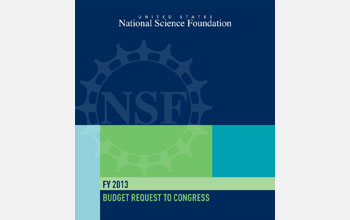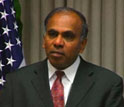News Release 12-027
National Science Foundation Budget Positions U.S. to Maintain Competitive Edge
President provides 5 percent increase for NSF to invest in fundamental research, advanced manufacturing, cybersecurity, sustainability and education priorities

The fiscal 2013 budget request ensures the nation's prosperity and competitiveness.
February 13, 2012
View a webcast with Dr. Subra Suresh discussing the FY 2013 NSF Budget Request to Congress.
This material is available primarily for archival purposes. Telephone numbers or other contact information may be out of date; please see current contact information at media contacts.
National Science Foundation (NSF) Director Subra Suresh today detailed the president's $7.373 billion fiscal year 2013 budget request for the agency, emphasizing that new knowledge resulting from federal investments in science and technology is needed to ensure the nation's future prosperity and global competitiveness.
As part of the President's Plan for Science and Innovation, his budget sustains the commitment to double funding for three key science agencies: NSF, the Department of Energy's Office of Science and the National Institutes of Standards and Technology laboratories. The fiscal 2013 budget for NSF includes an increase of $340 million, or 5 percent, over the fiscal 2012 enacted budget level.
"This investment in science and engineering reflects an increase in core research funding and moves our nation forward by connecting the science and engineering enterprise with potential economic, societal and educational benefits in areas critical to job creation and a growing economy," said Suresh.
Specifically, the NSF fiscal 2013 budget request is designed to:
- Strengthen fundamental research and education to bolster innovation, support economic growth, foster opportunities in the private sector, spur high-technology job creation and address complex societal challenges.
- Support transformative research in advanced-technology manufacturing by investing in research that makes manufacturing faster, cheaper and smarter, including research in materials sciences, robotics and nanotechnology.
- Address national challenges in environmental sustainability, through investments in clean energy and manufacturing, water and ocean resource management and response to natural disasters.
- Improve national security and reduce cyber vulnerabilities by developing high-quality digital systems, new technology to mitigate threats and a well-trained, cybersecurity workforce.
- Enhance science and math education by disseminating evidence-based learning and infusing scientific discovery into kindergarten through undergraduate education.
- Promote agency excellence by improving efficiency and effectiveness using the OneNSF organizing framework.
"Federal investments in fundamental science and engineering are increasingly important to help establish U.S. leadership in next-generation technologies, especially as other nations intensify their support of research, development and education," commented Suresh. "Despite the critical budget environment, we must make reasonable investments to secure our nation's future prosperity."
Some highlights in the NSF fiscal 2013 budget include:
- $308 million for multidisciplinary research targeted at new materials, wireless communications, "smart" infrastructure and robotics technologies.
- $110 million for cybersecurity research and education via the Secure and Trustworthy Cyberspace and the Federal Cyber Service: Scholarship for Service programs to protect the nation's critical information technology infrastructure, including the Internet, from a wide range of threats that challenge its security, reliability, availability and overall trustworthiness.
- $106 million for the Cyberinfrastructure Framework for 21st Century Science and Engineering initiative, which aims to build the next generation of computer tools and resources and enable their use by all scientific disciplines.
- $203 million for the Science, Engineering and Education for Sustainability portfolio, which includes priority work on clean energy alternatives, sustainable chemical and manufacturing practices, water conservation, ocean acidification, natural disaster prediction and response and understanding the changes occurring in coastal and Arctic ecologies.
- $19 million to the NSF Innovation Corps to jumpstart a national innovation ecosystem, bridging the gap between discovery and downstream technological innovations.
- $63 million to support interdisciplinary work through the Integrated NSF Support Promoting Interdisciplinary Research and Education initiative. The effort will enhance multidisciplinary research by encouraging collaboration and intelligent risk-taking.
- $196 million to continue construction of four large-scale facilities essential to discovery: the Advanced Laser Interferometer Gravitational-Wave Observatory, Ocean Observatories Initiative, National Ecological Observatory Network and Advanced Technology Solar Telescope.
The suite of educational investments in NSF's fiscal year 2013 budget request builds on the recognition that science and engineering talent is the foundation for America's future. Areas of educational investments run the spectrum from early learning to college completion.
"Developing a highly capable and diverse science and engineering workforce is another one of NSF's greatest contributions to the nation's innovation system," said Suresh. "By integrating research and education, new knowledge is transferred directly into the private sector."
NSF's educational investments include:
- $30 million to transform K-16 mathematics teaching and learning through a new partnership with the Department of Education.
- $20 million for the Widening Implementation and Demonstration of Evidence-Based Reforms program to move improved undergraduate STEM education instructional practices and curricular innovations to scale. This program will support research on how to achieve widespread sustainable implementation of undergraduate instructional practices leading to improved student outcomes.
- $61 million for the Transforming Undergraduate Education in Science, Technology, Engineering and Mathematics program to reformulate undergraduate education by creating new learning materials, and improving teaching strategies, faculty development and evaluation approaches informed by the latest scientific research.
- $49 million to bring engaging science content, knowledge and applications to more learners via the new Expeditions in Education activity.
OneNSF continues to empower the agency to leverage resources and opportunities for maximum impact. The agency will continue to perform as a model organization, keeping administrative and management costs at a mere 6 percent of the agency's annual budget in fiscal 2013.
NSF's 2013 budget request includes reductions to increase efficiencies in our external programs and internal operations in order to ensure the best value for taxpayers' investments.
"For 61 years, NSF has kept all disciplines of science and engineering healthy and strong. We have leveraged resources using a competitive, merit review process in order to maximize the impact of our investments," said Suresh. "The 2013 budget request identifies clear priorities that will produce direct, long-term benefits for the nation."
Additional information regarding the National Science Foundation's FY 2013 Budget Request is available on the NSF Web site.
-NSF-
-
View Video
NSF Director Subra Suresh discusses the agency's $7.373 billion fiscal year 2013 budget request.
Credit and Larger Version
Media Contacts
Bobbie Mixon, NSF, (703) 292-8485, email: bmixon@nsf.gov
Related Websites
FY 2013 Budget Request: http://www.nsf.gov/about/budget/fy2013/index.jsp
The U.S. National Science Foundation propels the nation forward by advancing fundamental research in all fields of science and engineering. NSF supports research and people by providing facilities, instruments and funding to support their ingenuity and sustain the U.S. as a global leader in research and innovation. With a fiscal year 2023 budget of $9.5 billion, NSF funds reach all 50 states through grants to nearly 2,000 colleges, universities and institutions. Each year, NSF receives more than 40,000 competitive proposals and makes about 11,000 new awards. Those awards include support for cooperative research with industry, Arctic and Antarctic research and operations, and U.S. participation in international scientific efforts.
Connect with us online
NSF website: nsf.gov
NSF News: nsf.gov/news
For News Media: nsf.gov/news/newsroom
Statistics: nsf.gov/statistics/
Awards database: nsf.gov/awardsearch/
Follow us on social
Twitter: twitter.com/NSF
Facebook: facebook.com/US.NSF
Instagram: instagram.com/nsfgov



